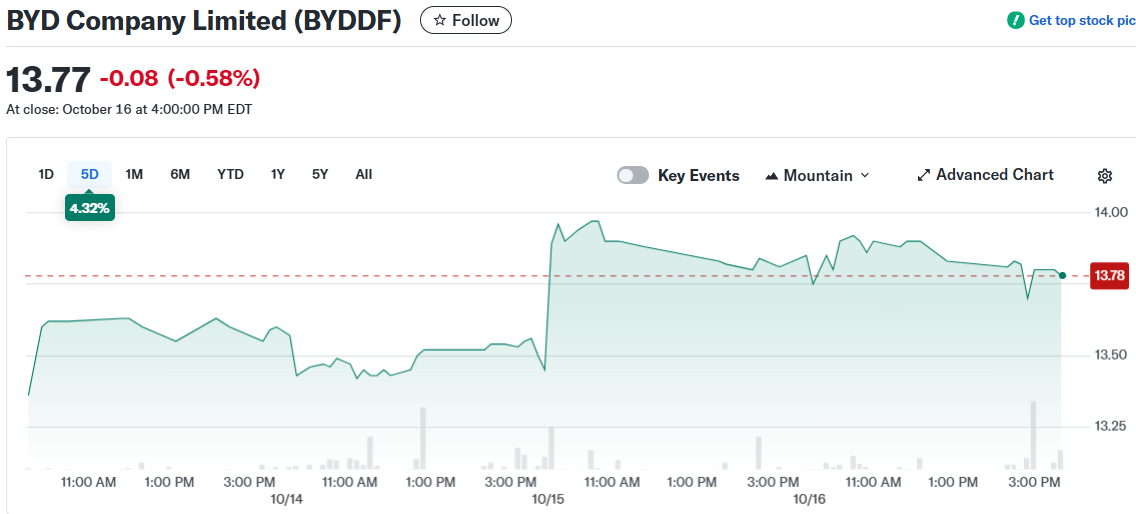TLDR
- BYD recalls 115,000 vehicles in China for design defects and battery fire risks, marking the company’s largest pullback ever
- Stock fell 4.5% in Hong Kong following the announcement, extending a 32% decline from May 2025 peaks
- Fourth major recall in 12 months includes Tang SUVs and Yuan Pro EVs with safety issues
- Morgan Stanley forecasts 68-89% overseas sales growth in 2026 despite current challenges
- Analysts maintain Moderate Buy rating with $24.90 price target suggesting 80.83% upside
BYD stock dropped 4.5% in Hong Kong after announcing its largest vehicle recall. The Chinese electric vehicle manufacturer will pull over 115,000 cars from the market.

China’s State Administration for Market Regulation approved the recall plan on Friday. Two separate vehicle models face safety problems.
The recall covers 44,535 Tang series SUVs built between March 2015 and July 2017. Design flaws could cause component malfunctions in these vehicles.
Another 71,248 Yuan Pro electric vehicles manufactured from February 2021 to August 2022 have battery installation defects. These problems create potential fire hazards.
BYD will replace faulty parts at no charge to owners. The staged rollout aims to ensure parts availability and reduce customer inconvenience.
Safety Problems Continue
This marks BYD’s fourth major recall in recent months. The company recalled 6,843 Fangchengbao Bao 5 hybrid SUVs in January 2025 for fire risks.
In September 2024, BYD pulled approximately 97,000 Dolphin and Yuan Plus EVs. Those vehicles had steering defects that could cause fires.
The total recall count now exceeds 219,000 vehicles in less than a year. Quality control questions emerge as BYD expands production capacity.
Competition intensifies from Tesla, Nio, and XPeng in China’s crowded EV market. BYD stock has fallen 32% from May 2025 highs.
Analysts See Growth Potential
Morgan Stanley maintains optimism about BYD’s future despite current setbacks. The firm highlights international expansion as a key strength.
BYD sold roughly 700,000 vehicles overseas in the first nine months of 2025. The company targets 900,000 to 1 million international sales for the full year.
Analysts project 1.6 million to 1.8 million overseas sales in 2026. This represents 68% to 89% year-over-year growth outside China.
Morgan Stanley expects inventory issues to resolve soon. Heavy short positions could trigger a rebound if sales data improves.
Market Outlook
Wall Street analysts give BYD a Moderate Buy consensus. Seven analysts rate it a Buy while three recommend Hold.
The average price target reaches $24.90 per share. This implies 80.83% potential upside from current trading levels.
BYD shares gained 22.8% year-to-date through mid-October. The stock trades under pressure following repeated quality issues.
July 2025 marked BYD’s first monthly production decline in 16 months. Vehicle output fell 0.9% while sales increased 0.6%.
The company plans to begin production at its new Hungary facility by late 2025. BYD currently offers discounts on Qin Plus sedan models through December.





